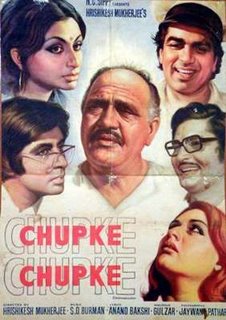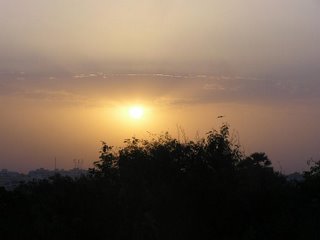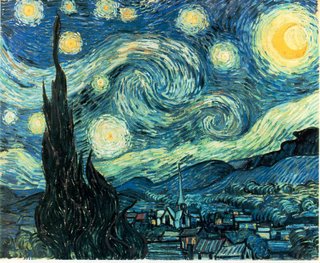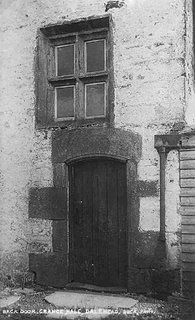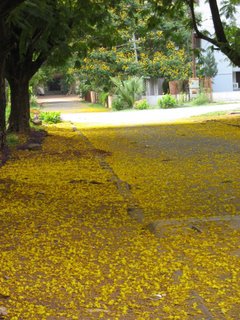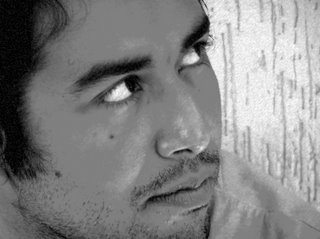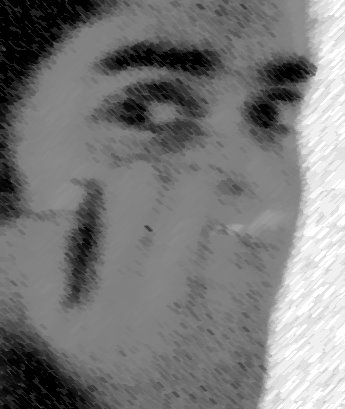My labour of love was flung on my face (well almost)...
Five hours of pure meditation produced something which , am if not proud of , quite happy with...i rush to my course instructor only to be told that he doesnt want me in his course (well cant blame him, i slept through his course, bunked classes and did not submit assignments)...but that doesnt take anything away from those five hours of "intense academic concentration"....
Tarkovsky's Sacrifice...
Anyone could characterize Tarkovsky's work as meditative plodding, which is both right and wrong: the meditation is often rewarding and always more intellectually appealing than the work of most other filmmakers, but it can also venture into the realm of the ponderously ponderous. Who is doing more philosophizing, Tarkovsky or his characters? Sometimes I cannot tell, and those instances lack the immediacy of an artist (in the guise of the character) poignantly reaching his philosophical limit and an emotional climax at which he can only gaze helplessly into the unknown. At such times, Tarkovsky momentarily loses control of his themes, and that some of his films more or less lack clear resolutions (and I don't mean simple or reassuring in the Spielbergian sense, but simply that we are able to discern without mistake what remains) seems to emphasize this. But that doesn’t take away anything from the spiritual world he creates through the journey of his characters…
In Tarkovsky's last film, The Sacrifice, we see the hero, in a black-and-white sequence, running from a house in which we have just seen a nude young woman in a bedroom. We then see him wandering in a large garden, where he picks up some small coins from the mud and rotting leaves, before freezing into immobility amidst the falling snow and the old trees, which thanks to his brilliant camera work seems to be a part of his being. The eerie calmness of this sequence is akin to the feeling of waking up after a horrible nightmare, but it is neither one nor the other, its something in between nightmare and reality. It seems to be a feeling captured in celluloid. Something which is as personal as inner breathing. The tangibility of which, seeps in only after you meditate on it.
This particular scene is quintessential Tarkovsky, not because it is characterized by his trademark craftsmanship, but because it carries within its fold, Tarkovsky’s understanding of the human nature.
The Sacrifice is a story of lack of spirituality in mankind; it’s about Alexander, a journalist and former actor and philosopher, who tells his little son how worried he is about the lack of spirituality of modern mankind. In the night of his birthday, the third world war breaks out. In his despair Alexander turns himself in a prayer to God, offering him everything to have the war not happened at all.In his attempt to charter the spiritual journey of his protagonist, Tarkovsky, meticulously depicts, through visual metaphors, the spiritual journey of the mankind.
In the opening scene of The Sacrifice the hero's son and a postman appear on the shore of a bay, where the hero - before a motionless camera, no a very slowly moving camera - is transplanting a withered sapling. They approach as if they were dragging along the vastness of the whole world outside from over the horizon. Their garrulousness (the postman) and their silence (the mute son) seem to form a complete, "synthesized" chord with the hero's soliloquy, in which they gradually join. The use of sound in Tarkovsky's films is legendary, however. His unique "music" which almost always manages to unsettle me, is intrusive, discreet by turns, at odds with, and in harmony with the images, is an inseparable element of the director's vision. Even if we take only The Sacrifice, we find images on the screen accompanied by the sound of an unseen coin tapping (as the tired hero falls asleep on the couch), a loose sheet of corrugated iron clattering in the breeze (as the introduction to a scene showing the Alexander's son asleep), and distant music and ancient chants in Swedish or Japanese (hence remote in space and time). The sounds themselves transport the visual to a distant setting, to other lands and other times, which provide the indispensable counterpoint to its present reality.
The spiritualization is not limited to human beings; his brilliant use of light manages to breath life to the most inanimate objects, giving them spirituality, and through them an understanding of his spiritual world begins to develop. A gleaming porcelain jug, which carries within its fullness the satisfaction of human thirst, is given its due screen time…
The cupboard, whose door twice opens beside one of the characters without anyone touching it, has a life of its own…
It is not that everything in it is inseparably tangible, sensual, and "spiritual", that the outward form of things cannot be divorced from their emotive significance, from the investigation of their inner meaning - his films are unmistakable evidence of the functioning of one person's subjective vision. Tarkovsky’s vision is self generating , it constantly needs to be subjectified, in fact at times one feels that these are images that the director did not invent but allowed to happen…
In brief, this film seems to have been created almost in the biblical sense, as something with an independent existence. And through the movie one experiences the world with redoubled intensity.Tarkovsky's images are not merely the product of his inner vision; they also have the ability independently to increase and multiply infinitely… during the fire scene in a nearby meadow we find a replica of the hero's house reduced to the size of a child's toy. As it was evidently placed here by the hero's son, as a birthday present for his father, it suggests an image of the future taking shape in the present, the reduplication of the present in the future...
In Tarkovsky's work, childhood is a treasure lost before it has begun. The creak of the sheet-iron, which, with the flickering light, accompanies the hero's son as he falls asleep in The Sacrifice, announces the destruction of the house in which he is growing up, and lays the foundations for his future on this loss.
The idea of fertility and regeneration seems to be a recurrent albeit disillusioned one in The Sacrifice (even though the mute child through his act of nurturing, seems to give us some respite from the feeling of desperation that overwhelms by the end of this film).
All Tarkovsky's female characters, incidentally, appear at once calm and troubled, aristocratic and primitive. They give the impression of being like "God's creatures", dedicated to higher things, but also possessed by the devil. They seem to hold the key to good and evil, love and hate. When the hero's wife is seized by convulsions on hearing of the approach of war, she writhes on the floor, with her skirt riding up her thighs, as if shaken at once by insatiability and an organic need to destroy.
The heroine of The Sacrifice is symmetrically complemented by the countrywoman Maria, who evokes at once Christian sainthood (by her name) and a pagan priestess, b the act of love with the hero she enables him to save the world from destruction.
"Once upon a time, long ago an old monk lived in an orthodox monastery. …." Alexander narrates a story to the "little man". "Once he planted a withered tree on a mountain side. Then he told his pupil, a monk named Kolov, to water the tree each day until it came to life. Every morning he filled a water carrier and went out. He climbed the mountain and watered the withered tree and at night fall he returned to the monastery. He did this for three years and one fine day, when he climbed the mountain, he saw the tree covered in blossom".
The story that a father narrates to his son seems to be the essence of Andrei Tarkovsky’s
The Sacrifice….
Premankur Biswas.












